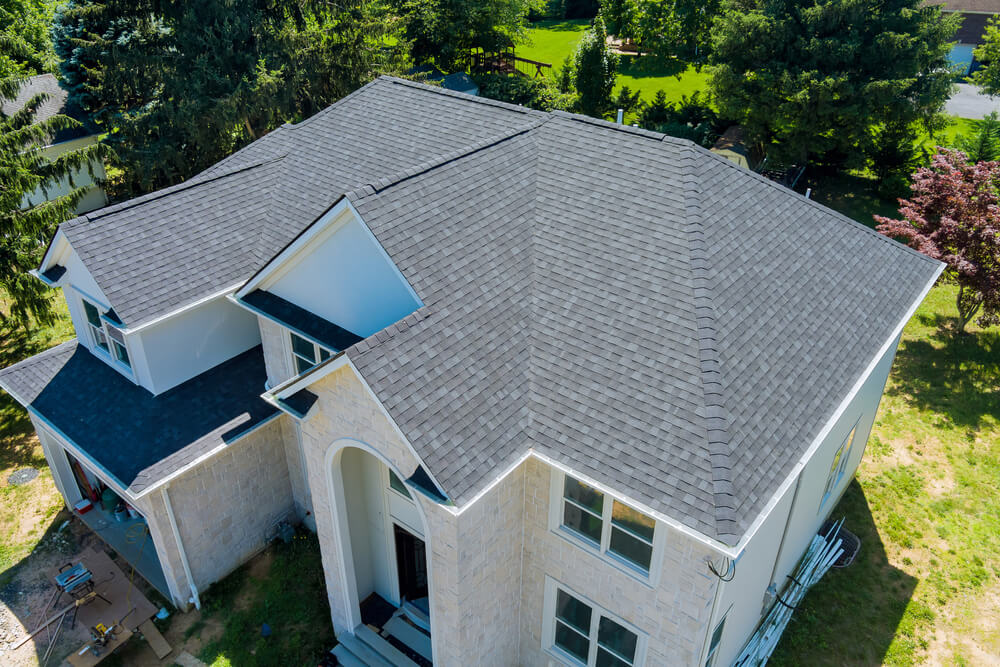
Asphalt shingles are a prevalent choice for roofing material in many parts of the world, praised for their balance of cost-effectiveness, durability, and versatility. They consist of a base mat of organic felt or fiberglass, onto which asphalt is applied and then covered with mineral granules. This construction lends itself to a wide range of styles, colors, and textures, making asphalt shingles a favored option for homeowners looking to customize their home’s aesthetic without compromising on protection.
Choosing asphalt shingles comes with several advantages. Their ease of installation and relatively light weight reduce labor and time on site, translating to cost savings for property owners. Furthermore, asphalt shingles offer reliable performance against weather elements, with certain types engineered to resist algae growth, high winds, and fire.
Types and Benefits of Asphalt Shingles
Asphalt shingles are widely used roofing materials, prized for their balance of durability, affordability, and aesthetic variety. This section unravels the different types available and the key advantages they bring to both residential and commercial properties.
Types of Asphalt Shingles
Primarily there are three types of asphalt shingles, each suited to different requirements and aesthetic preferences.
- Three-Tab Shingles: Economical and lightweight, they are differentiated by cutouts—tabs—made along their long lower edge, giving the appearance of three separate pieces when installed.
- Dimensional Shingles: Also known as architectural or laminate shingles, they are thicker and offer a richer, multi-dimensional appearance, resembling natural wood or slate.
- Luxury Shingles: High-end options that provide maximum durability, superior aesthetics, and often replicate the look of natural slate or cedar shake roofing.
These variations cater to residential asphalt shingles needs from basic to premium installations, as well as commercial asphalt shingles applications demanding longer-lasting materials with a robust feature set.
Key Benefits
Asphalt shingles provide several compelling advantages that merit their popularity in the roofing market.
- Durability and Longevity: While the lifespan of asphalt shingles can vary, they generally offer good resistance to extreme weather conditions and can last anywhere between 15 to 30 years depending on the type and quality.
- Cost-effectiveness: Compared to other roofing materials, asphalt shingles are cost-efficient not just in upfront costs, but also in terms of long-term maintenance.
- Wide Range of Styles and Colors: They are available in an extensive array of styles and colors, enabling customization to complement various architectural designs.
Offered in various grades, from value options for tight budgets to premium choices that provide enhanced performance characteristics, asphalt shingles represent an adaptable roofing solution.
Asphalt Shingle Selection and Installation
Before embarking on a roofing project, one must understand the importance of choosing the right asphalt shingles and follow a precise installation process to ensure durability and optimal performance.
Choosing the Right Asphalt Shingles
When selecting asphalt shingles, homeowners should contemplate several critical factors. Climate suitability is paramount; one must choose shingles that can withstand the local weather conditions, be it intense sun, heavy rain, strong winds, or snow. Aesthetic preferences also play a vital role, as shingles come in various styles and colors that can enhance a home’s visual appeal.
Installation Process
Proper roof preparation is the foundation of successful asphalt shingle installation. The old roofing material must be completely removed and the roof deck inspected for any necessary repairs. Underlayment should be laid out to provide an extra layer of protection from water infiltration. The shingle application requires meticulous attention to detail. Starting from the bottom edge of the roof, shingles must be properly aligned and secured with nails.
Key installation steps:
- Remove existing shingles and repair roof deck
- Apply underlayment and install flashing
- Begin shingle application from the roof’s bottom edge
- Follow specific nailing patterns and overlap shingles correctly
- Cut and fit shingles around obstacles like vent pipes
- Check for uniformity and adherence to structural standards
Maintaining and Repairing Your Asphalt Shingle Roof
Proper maintenance and timely repairs are crucial to prolong the lifespan of asphalt shingle roofs and to prevent serious issues. This section will outline practical tips for upkeep and solutions for common roofing problems.
Maintenance Tips
Regular Inspections: They should be conducted at least twice a year and after any major storm. Checking for missing, cracked, or curled shingles as well as inspecting for signs of wear such as granule loss is vital.
Cleaning and Moss/Algae Prevention: Algae and moss growth can be prevented with zinc or copper strips installed at the roof’s peak which release particles that inhibit growth. Regular cleaning can also include gently removing debris with a soft brush or blowers.
Common Problems and Solutions
Repairing Damaged Shingles:
- Partial Shingle Replacement: If a few shingles are damaged, it is often possible to replace just these shingles. Use roofing cement and a pry bar for careful removal and then secure the new shingle with roofing nails.
- Full Shingle Tab Replacement: When a whole shingle tab is missing or severely damaged, a replacement tab can be adhered to the remaining part.
Leaks and Water Damage:
- Prompt Action: Immediate repair is crucial to prevent structural damage. Identify the penetration points and apply roofing sealant underneath the compromised shingle.
- Flashing and Boot Replacement: Check and if necessary, replace flashing and boots around chimneys and vent pipes, as they can be entry points for water.
Granule Loss:
- Inspection for Underlying Issues: Excessive granule loss is a sign of aging shingles or physical damage. Inspect to determine if a repair or roof replacement is necessary.
By adhering to these specific tips and solutions, homeowners can successfully maintain and extend their life and handle common problems with roof shingles.
Cost Considerations and Professional Installation
When considering the installation of asphalt shingles, it’s important to navigate the cost variables and the significance of professional expertise to ensure a balance between quality and expense.
Understanding Roofing Costs
Asphalt shingle roof cost are influenced by several factors including the size of the roof, the type of shingles, the complexity of the job, and geographic location. Shingle prices typically range from $100 to $150 per square (100 square feet), not including labor.
- Material Costs: Standard 3-tab shingles are the most cost-effective, while architectural shingles are slightly more expensive but offer aesthetic appeal and longer durability.
- Labor: This can vary widely but often runs between $150 to $300 per square.
- Removal of Old Roofing: Typically costing between $3 to $5 per square foot, this must be factored into the total price.
- Additional Components: These include underlayment, flashing, and ventilation, each carrying its own costs.
A detailed estimate from a professional can provide a more accurate idea of total cost.
Choosing a Roofing Expert
Selecting a skilled roofing company is crucial for the longevity and performance of an asphalt shingle roof. Universal Roofing & Exteriors is a leading contractor with a solid reputation for installing asphalt shingles with precision.
- Credentials: Look for licensing, insurance, and certifications. A reputable company will be transparent about their qualifications.
- Experience: Prioritize companies with extensive experience, particularly in asphalt shingle roofing.
- Portfolio and References: Successful roofing companies like Universal Roofing & Exteriors can demonstrate expertise with a robust portfolio and positive customer testimonials.
- Warranty and Aftercare: Verify the availability of a comprehensive warranty and after-installation care services.
By meticulously evaluating the roofing services and solutions on offer, clients can entrust the integrity of their residential or commercial properties to professionals who value quality workmanship.







